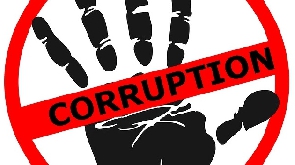 Corruption has defied years of economic and political reforms n Ghana
Corruption has defied years of economic and political reforms n Ghana
Corruption in public life has been baneful to the socioeconomic and political advancement of Ghana. It has been both a cause and consequence of the structural decay bequeathed by decades of rent-seeking politics of the post-colonial state in Ghana. As a phenomenon, corruption has defied years of economic and political reforms, has continued to grow, and has undermined efforts to improve the standards of living of Ghanaians and foster democratic governance.
Of course, public concern with the problem of corruption in Ghana has a long history. It dates back at least from the early 1960s (First Republic) when it became the main subject of the “Dawn Broadcasts” of President Nkrumah. Other official actions to combat corruption in post-colonial Ghana include high-profile judicial and extra-judicial commissions of enquiry, followed sometimes by punishment.
Perhaps the “housecleaning exercise” and enforcement of measures to promote “probity and accountability” associated with the “revolutions” of 1979 and the early 1980s (including the execution of 3 former heads of state, imposition of stiff sentences and confiscation of assets of top public officials for alleged corruption represent the most dramatic form of the efforts to combat corruption in Ghana.
Since the return to constitutional rule in 1993 and especially in recent years, public interest in the issue of corruption has grown steadily. Concern with corruption and the desire to curb it informed the establishment of an independent Commission on Human Rights and Administrative Justice (CHRAJ) under the 1992 Constitution and the Serious Fraud Office by an Act of Parliament. Most significantly, corruption and indiscipline were two of the key issues mentioned by President Rawlings in his Sessional Address to Parliament on January 13, 1998.
He reiterated the same issue in his Sessional Addresses of 1999 and 2000 to the same body. The subject of corruption has also come under scrutiny at the National Forum on “Transparency and Accountability for Good Government” organized by the United Nations Development Program (UNDP), National Institutional Renewal Program (NIRP), and the Parliament of Ghana in July 1998, and at the first “National Integrity Workshop” under the auspices of the Commission on Human Rights and Administrative Justice (CHRAJ) in October of the same year.
Civil society has also taken a growing interest in the problem of corruption. The media, especially the non-state media, has demonstrated a keen interest in the subject. It has provided a steady stream of exposures, some of which have attracted the attention of public investigation bodies such as
CHRAJ and SFO. Moreover, in December 1997, the Catholic Bishops Conference issued a “pastoral” letter on the problem; it also adopted “corruption” as the target of its moral crusade. Several prominent Christian and other religious bodies have formed an umbrella organization called the Moral Rearmament Group to campaign against corruption.
Civil society is mobilizing to push for curbs on corruption under the aegis of the Ghana Integrity Initiative (GII), which is also the local chapter of Transparency International inaugurated in December 1999. A recent and relatively novel development in the fight against corruption in Ghana has brought together key public and non-governmental bodies to mobilize against corruption. Called the Ghana Anti-Corruption Coalition, it comprises the National Institutional Renewal Program (NIRP), Serious Fraud Office (SFO), Institute of Economic Affairs (IEA), CHRAJ, GII and Centre for Democracy and Development (CDD).